May 24, 2025 | 16:21 GMT +7
May 24, 2025 | 16:21 GMT +7
Hotline: 0913.378.918
May 24, 2025 | 16:21 GMT +7
Hotline: 0913.378.918
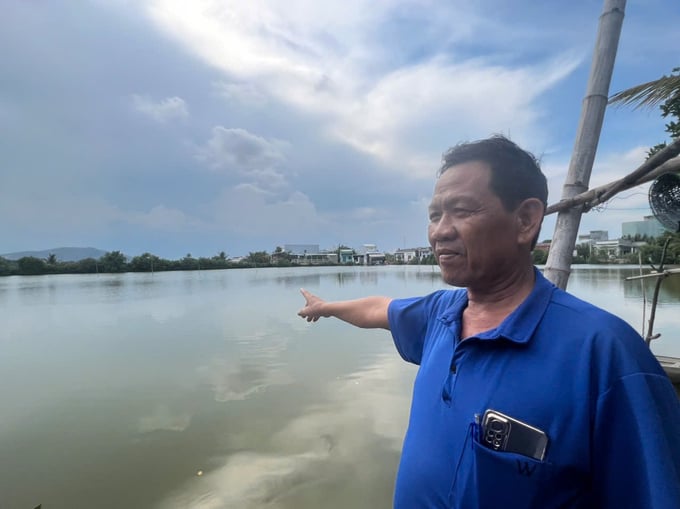
Mr. Ho Trong Lap shows his aquaculture area in Vinh Quang 2 village, Phuoc Son commune (Tuy Phuoc district, Binh Dinh). Photo: V.D.T.
That is Mr. Ho Trong Lap from Vinh Quang 2 village, Phuoc Son commune (Tuy Phuoc district, Binh Dinh), who was recently honored as an Outstanding Vietnamese Farmer in 2024 for his impressive achievements in agricultural production.
In 1995, Mr. Lap invested all his savings to participate in an auction for 1 hectare of water surface in his locality for aquaculture. As the saying goes, "Every beginning is difficult". Initially, he faced numerous obstacles due to a lack of experience and insufficient investment capital, which hindered the success of his business.
However, Mr. Lap is known for his resilience and determination. Rather than giving up, he dedicated several years to not only working but also learning from various sources. He immersed himself in books, sought advice from those who had more experience, participated in training courses, and visited effective production models.
As a result of his dedication and learning, Mr. Lap developed expertise in managing various aspects of aquaculture. He became proficient in handling issues related to acidity in his ponds, mastering techniques for measuring pH and alkalinity. He also learned how to cultivate algae and zooplankton to provide nutritious feed for his shrimp, crabs and fish. Most importantly, he gained valuable knowledge about selecting high-quality seed stock for his farming endeavors.
In 2014, after gaining access to bank financing, Mr. Lap took a bold step by renting 5 hectares of water surface to implement a improved extensive farming method, where he raised shrimp alongside crabs and different types of fish.
Mr. Lap believes this approach is not only economically viable but also environmentally friendly. The primary species he cultivates include black tiger shrimp, crabs, and a variety of fish. Each year, he conducts a lengthy cultivation cycle, carefully timing the stocking and harvesting of his crops based on the specific species and the tidal conditions.
Mr. Ho Trong Lap explained, ‘When compared to industrial farming, the improved extensive farming method results in lower yields of black tiger shrimp, crabs, and various fish species. However, it offers a stable income. I harvest daily, and traders come directly to purchase from my lagoon. This consistency has significantly improved my family's financial situation, allowing us to not only stabilize our income but also save some money. As a result, I was able to build a comfortable home and support my three children through college".
With his 5 hectares of water surface cultivated under the improved extensive farming method that incorporates scientific techniques, Mr. Lap manages to harvest between 7 to 8 tons of shrimp, 4 tons of various fish, and 4 tons of crabs each year. In 2023, his family reported a remarkable profit of around 58.000 USD, showcasing the success of his sustainable farming practices.
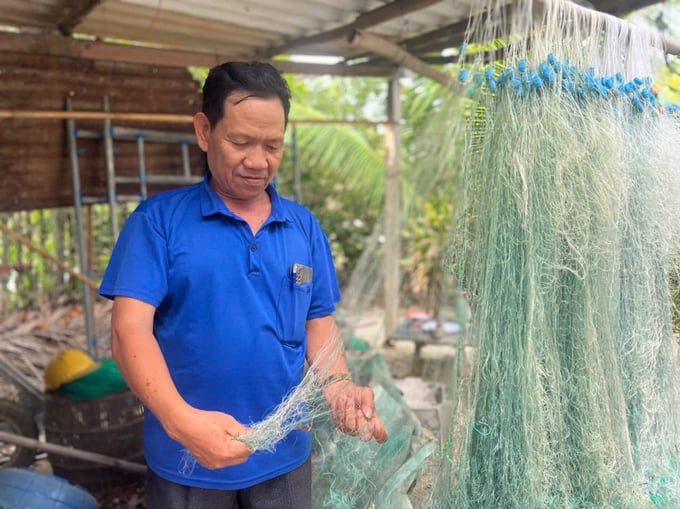
Mr. Ho Trong Lap is preparing nets to harvest the aquaculture from the lagoon. Photo: V.D.T.
According to Mr. Lap, to achieve success in aquaculture amidst the challenges of water pollution, he invests considerable effort in meticulously rehabilitating the lagoon before each new farming season.
After draining the water from the lagoon, Mr. Lap carefully dredges the bottom and applies lime to enhance alkalinity. This crucial step helps to significantly improving the oxygen levels in the bottom layer and enriching the nutrient content of the lagoon. Furthermore, Mr. Lap utilizes several techniques to enhance the water color, which in turn promotes the growth of natural food sources for the aquatic species he cultivates.
Mr. Lap places special emphasis on selecting high-quality seed stock, which he considers a crucial prerequisite for success in aquaculture. This careful attention to the quality of the seedlings is fundamental to achieving optimal growth and productivity in his farming operations.
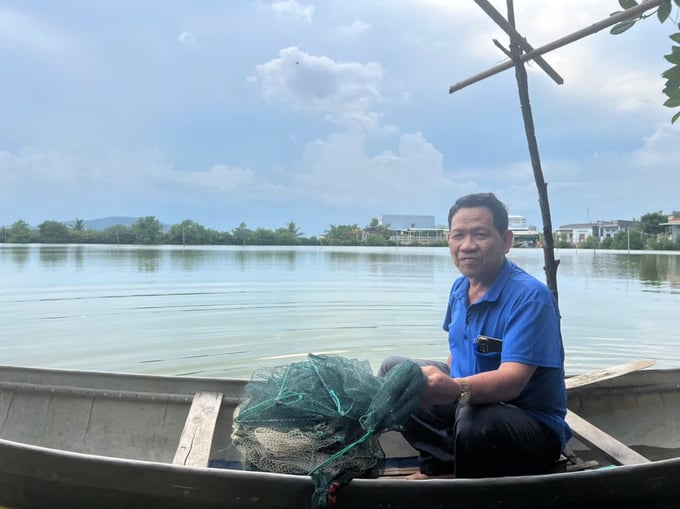
Mr. Lap is inspecting the aquaculture in the lagoon. Photo: V.D.T.
Mr. Lap emphasized, "In aquaculture, disease prevention is crucial. Once shrimp or crabs fall ill, it becomes extremely difficult to treat them effectively. To mitigate this risk, I also take advantage of natural food sources, prepare homemade feed, and implement biological methods to maintain a healthy farming environment.
From my practical experience, I can assert that the model of raising black tiger shrimp, crabs, and fish through the improved extensive method is not only highly effective but also very reliable. If the shrimp experience setbacks, the crabs and fish can help offset any losses, ensuring that farmers do not face total financial ruin. Moreover, the quality of the shrimp, crabs, and fish produced through this approach is exceptional and highly favored in the market".
“The water quality for aquaculture is becoming increasingly polluted, and the aquaculture industry in Binh Dinh faces growing risks of disease outbreaks. As a result, shrimp farmers in Binh Dinh are gradually shifting towards integrated aquaculture models and polyculture practices in brackish water areas", shared Mr. Huynh Quang Nhat, Deputy Director of the Binh Dinh Agricultural Extension Center.
Translated by Phuong Linh
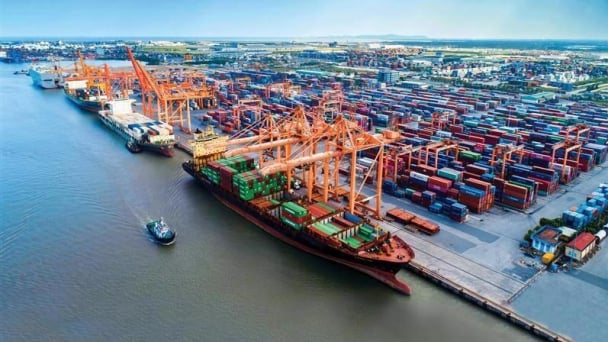
(VAN) South Korea is currently the second-largest investor in Hai Phong in terms of the number of projects (186 projects) and the largest in terms of total registered investment capital, reaching USD 14.2 billion.
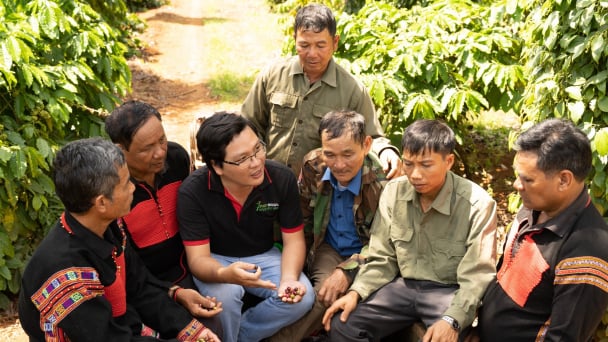
(VAN) As consumers become more environmentally conscious, legal regulations grow increasingly stringent...
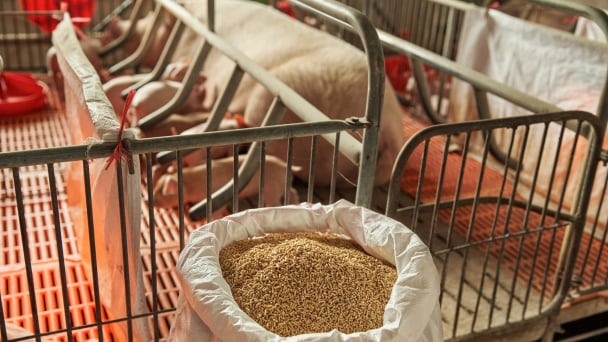
(VAN) CJ Feed&Care officially launched the FCR improvement campaign called “2025 Find Challenge Reach” in April 2025. In Vietnam, this campaign is implemented by CJ Vina Agri.
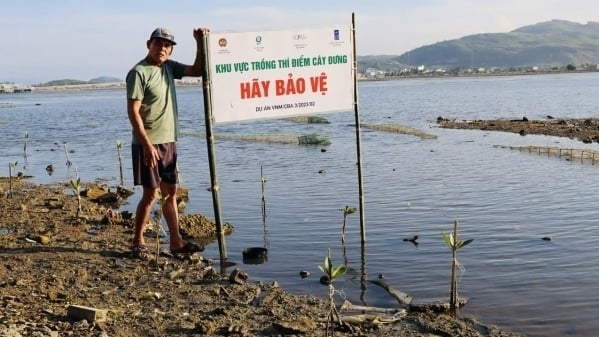
(VAN) The swamp in Pho Thanh is gradually being covered with red mangrove, creating a favorable environment for producing clean, high-quality salt.
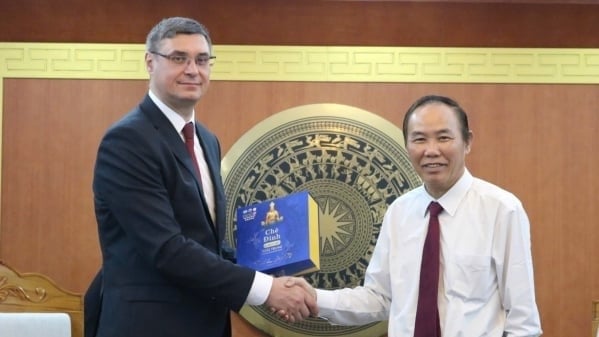
(VAN) The trade turnover of agro-forestry-fishery products is growing significantly, along with investment cooperation commitments that are opening up new development directions between Vietnam and Russia.

(VAN) Khanh Hoa is investing over 545 billion VND to develop 240 hectares of high-tech marine aquaculture in order to guarantee a consistent supply of seafood exports and achieve the USD 1 billion target.

(VAN) Minister of Agriculture and Environment Do Duc Duy held a meeting with Soopakij Chearavanont, Chairman of C.P. Group, on May 15.